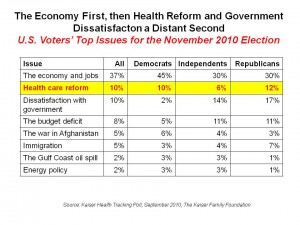 There’s more confusion among U.S. voters than ever about what health reform, the Accountable Care Act (ACA), means. The September 2010 Kaiser Health Tracking Poll reveals an electorate that’s not only confused, but quite split in their support — with those who oppose the law even stronger against it than the pro’s support it.
There’s more confusion among U.S. voters than ever about what health reform, the Accountable Care Act (ACA), means. The September 2010 Kaiser Health Tracking Poll reveals an electorate that’s not only confused, but quite split in their support — with those who oppose the law even stronger against it than the pro’s support it.
The Kaiser Family Foundation (KFF) survey found that the percentage of ACA proponents actually increased by 4 percentage points between August and September, from 45% to 49%. 41% of registered voters are “unfavorable,” and 10% still have no opinion about the law. When it comes to “likely voters,” though, there’s less support for health reform, dropping to 46% of likely voters vs. 45% of likely voters unfavorable toward ACA. That’s a 50/50 split in my lens.
Not surprisingly, Democrats have a far more favorable view on health reform than do Independents and Republicans. 75% of Democrats favor the new law, compared with 42% of Independents and 21% of Republicans.
Looking at voters’ perceptions of who will benefit from health reform is useful at understanding party perspectives: among all groups voters see benefiting from health reform are lower income Americans, the uninsured, and people with pre-existing conditions (60%, 57% and 55%, respectively). Only 32% of voters believe that “You and Your Family” will benefit from health reform.
Health Populi’s Hot Points: Health reform ranks a distant second to the economy in the context of all voters’ issues for November 2010. While 37% of voters say their #1 voting issue is the economy and jobs, only 10% of voters put health care reform at the top, with a similar percent saying “dissatisfaction with government” is motivating their vote. Government dissatisfaction is most important for 17% of Republicans, who will be working hard to dislodge Democrats from Congress in November.
It’s clear from the Sunday morning political talk shows that Republicans are keen to chip away at the ACA and change provisions. As part of the Republican Contract for America, Bloomberg reports that the GOP may try to de-fund health reform beginning with President Obama’s 2012 budget requests — a risky proposition perhaps. But if enough angry registered voters will turn out and vote on November 7, Bob Blendon of Harvard’s School of Public Health points out that repeal is “easy to understand if you’re an angry voter.”
In the meantime, watch the Sunday morning news pundits bring up this week’s story on McDonald’s potentially dropping health insurance coverage as part of the campaign to discredit the Accountable Care Act. Secretary of DHHS Kathleen Sebelius has already discredited this story.




 Interviewed live on BNN Bloomberg (Canada) on the market for GLP-1 drugs for weight loss and their impact on both the health care system and consumer goods and services -- notably, food, nutrition, retail health, gyms, and other sectors.
Interviewed live on BNN Bloomberg (Canada) on the market for GLP-1 drugs for weight loss and their impact on both the health care system and consumer goods and services -- notably, food, nutrition, retail health, gyms, and other sectors. Thank you, Feedspot, for
Thank you, Feedspot, for  As you may know, I have been splitting work- and living-time between the U.S. and the E.U., most recently living in and working from Brussels. In the month of September 2024, I'll be splitting time between London and other parts of the U.K., and Italy where I'll be working with clients on consumer health, self-care and home care focused on food-as-medicine, digital health, business and scenario planning for the future...
As you may know, I have been splitting work- and living-time between the U.S. and the E.U., most recently living in and working from Brussels. In the month of September 2024, I'll be splitting time between London and other parts of the U.K., and Italy where I'll be working with clients on consumer health, self-care and home care focused on food-as-medicine, digital health, business and scenario planning for the future...